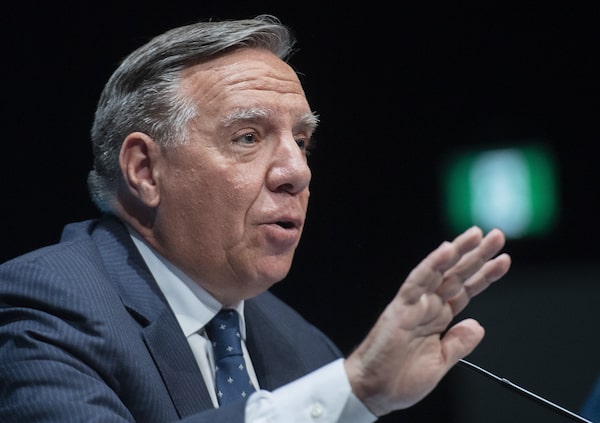
Coalition Avenir Quebec Leader François Legault speaks at a news conference outlining the party’s costed platform during an election campaign stop in Saint-Jerome, Que., Saturday, Sept. 10, 2022.Graham Hughes/The Canadian Press
The Coalition Avenir Québec’s campaign promises would increase the province’s projected budget deficit by $6 billion, according to the party’s costed platform, which promises a return to balanced budgets in five years.
The incumbent party has made $29.6 billion in promises, according to the costed platform released Saturday, including $21 billion for measures intended to help Quebecers deal with the rising cost of living.
That includes cheques of $400 or $600 that would be sent to the 6.4 million Quebecers who earn less than $100,000 a year, a one percentage point cut in the tax rates of the lowest two tax brackets and a three per cent cap on increases to government-set fees, such as hydro rates, public daycare fees and university tuition.
“It’s important for us to propose a fiscal framework that is responsible, that is prudent,” Coalition Avenir Quebec Leader François Legault told reporters in Saint-Jérôme, Que., north of Montreal, adding that plan includes an $8 billion cushion to deal with economic risk.
The new spending would increase the province’s projected deficit for 2022-2023 from $1.6 billion in a pre-election forecast to $7.6 billion.
Legault accused the Quebec Liberal Party and Québec solidaire, the only two parties that have already released their costed platforms, of being irresponsible.
“It’s not time to play cowboy with Quebecers money,” Legault said. “The last thing we want in Quebec is to find ourselves in the coming years with Liberal austerity and the cuts that we experienced in the last Liberal mandate.”
The Liberals, who released their costed platform on Monday, have promised to balance the budget in seven years. If elected, the party, which has promised $41 billion in spending over five years, would run annual deficits of between $2.8 billion and $6.7 billion, after payments to the province’s long-term debt repayment fund.
Québec solidaire, which released its costed platform Friday, would balance the budget in two years — paying for it through increased taxes from businesses and high-income earners and by suspending payments to the debt repayment fund.
The CAQ is counting on economic growth and $4 billion in program savings — which the party claims can be achieved without reducing services — to help return to a balanced budget in 2027-2028.
Liberal Leader Dominique Anglade accused the CAQ of inventing revenue and attempting to hide cuts to services, while Québec solidaire spokesman Gabriel Nadeau-Dubois said the CAQ framework is from another era because it includes no new funds to fight climate change.
As Anglade campaigned in the Eastern Townships on Saturday, she promised to give municipalities more taxation powers.
Anglade also promised a Liberal government would begin paying municipal property taxes on provincial government buildings, including schools. Currently, the government pays municipalities compensation worth 70 per cent of the tax bill. The additional payments would cost the government around $500 million over five years — an expense that doesn’t appear in the party’s costed platform.
Anglade wouldn’t comment on a Leger survey released Saturday, which suggests her party risks losing seats in its traditional strongholds of Montreal and Laval, the city’s largest suburb, to the CAQ and Québec solidaire.
The real poll will be on voting day, Anglade said.
“The voters are going to be watching the debates and everything that we’re doing,” she told reporters.
The first televised debate is scheduled to take place on Thursday.
In Quebec City, Conservative Leader Éric Duhaime promised to hold a summit on youth mental health within 100 days of taking office, if his party is elected.
Meanwhile, Parti Québécois Leader Paul St-Pierre Plamondon promised to create a ministry responsible for the status of women to take action on sexual and conjugal violence.
The province’s current secretariat for the status of women lacks the power, budget and influence of a full ministry, he told reporters in Montreal.
Nadeau-Dubois, who was campaigning in Quebec City on Saturday, said his party’s promise to cut university tuition fees by 25 per cent is a first step toward free higher education.
Nadeau-Dubois, who came to prominence as one of the leaders of Quebec’s 2012 student protests, said that at the time, he was advocating for a tuition freeze and that the 25 per cent reduction goes further than that.